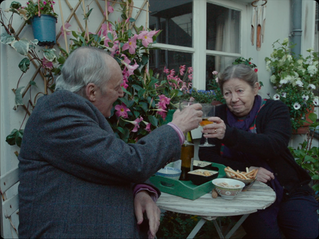Things to Come
- Emma Olsson
- Mar 18, 2022
- 3 min read
Mia Hansen-Løve, 2016

Nature rattles the leaves in their trees, moistens the grass at the start of a new day. It regenerates with a pattern that opposes the unpredictability of human relationships. In Days of Abandonment, a novel about a woman whose husband leaves her for a younger lover, Elena Ferrante writes: “We don’t know anything about people, even those with whom we share everything. The soul is an inconstant wind, a vibration of the vocal cords, for pretending to be someone, something.”
This inconstant wind flows through the fresh landscape of Mia Hansen-Løve’s Things to Come. In it we meet Nathalie, wandering in a liminal mist. Her story begins in spring. The air is crisp, the sun shedding the winter’s timidity. A sheer scarf flies in the wind, she swats it away. The earth oscillates between opposing states and Nathalie, left without another option, gives into the fluctuation.
Like Ferrante’s literary narrator, Nathalie is a woman abandoned. In one cruel gust, her husband leaves her, her position as a philosophy teacher is threatened, and her mother’s health enters a rapid decline. A woman accustomed to a quiet certainty over her place in life is forced to readjust. The seasonal promise of warmer and longer days looms. How is she to fill them when their contents are leaking out the sides?
For one, she can walk. Things To Come documents Nathalie’s internal transition through a physical journey as she travels to places both familiar and unknown.
The camera work is brisk and active, with many of the scenes documenting Nathalie in movement. She may appear calm, but on a deeper level her constant motion could signal the anxiety of a woman who doesn’t know where to go or where she belongs. This flux is rooted not in indecision, but in the discomfort of a person who has found herself without a comfort zone. The spaces in which she once found love, respite, and fulfilment now leave her empty-handed. The landscapes she meets on her travels offer temporary solace–a swim in the sea, a trip to the countryside to stay at a former student’s commune–but these spaces are not her own. She can never lay claim to them as she once did with her apartment, her classroom, her daily commute. She must move on.

Nathalie’s travels are marked by sobering alterity. At her family’s summer home, a momentary glow of happy memories leads to hurt. This place that once held so much joy has suddenly transformed; like a magician’s trick, the personal grows cold. At the student commune, this decoupling of place from feeling strikes again. The space is occupied by young radicals with whom Nathalie feels an inevitable distance. She can recite their politics with an expert’s understanding but without the youthful fervour, an act more akin to a possession of knowledge than a passion. Passion, unlike knowledge, is a truly singular sensation–it bursts out from your core and warms the body. Knowledge is impersonal.
Somewhere in the dialogue between emotion and place arises the question of freedom. In a scene where Nathalie is travelling by car with her ex-student, she remarks to him that she is finally, for the first time since her marriage, free. “I am so privileged, I am finally completely free.” At that moment, there is simultaneous belief and doubt in her words.
For independent and disciplined Nathalie, freedom is conceptualised as a state, as a place at which one arrives. In some ways, the film depicts this literal journey. But it also challenges her idea, standing as a testament to the inscrutability of freedom. One can never know it, never arrive at it, never truly possess it. Instead, through a movement between physical motion and internal turmoil, the film seems to posit a dynamism to freedom; it is something capricious and truly human. It cannot be acquired, but is felt in the flux of emotion, in the heat of movement, and in the loss of certainty. It echoes Ferrante’s verdict on life following abandonment: “Existence is a start of joy,” she writes. “A stab of pain, an intense pleasure, veins that pulse under the skin, there is no other truth to tell.”
Something momentary, something that defies logic, certainty, and one place: that is what freedom looks like for Nathalie.








Comments